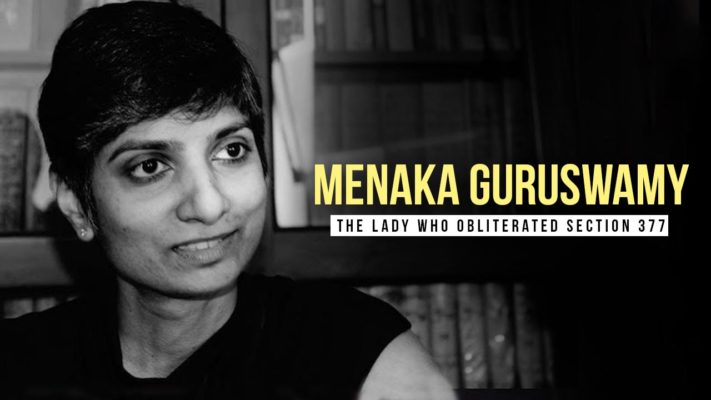
A Thousand And One Rainbows For Guruswamy- Liberty, Equality, And Fraternity
The immediate victims of bygone Section 377 must be the people belonging from the lowest stratum of the society from remote parts of India. They might even have been denied the opportunity to participate in gay parades or LGBT talk shows. They are afraid to declare their sexual orientation, forced to live in a heterosexual relationship simply because they have been denied any access to the monumental significance of the word ‘consent’. On sixth of September, we witnessed a grudging withdrawal of the demon lurking over these people, condemned to live on the outskirts of society. The journey from 2013 had been replete with major obstacles and oppositions, pushing India 200 years back, to the strict regimen of her colonisers. Let us, however, not forget the person who has played a crucial role in uplifting the veil of humiliation from the LGBTQ community- Menaka Guruswamy. Apart from being the first woman to have her portrait in the prestigious Milner Hall in Oxford, she is the flag bearer of a new epoch that has very little to do with Victorian moral scruples that our colonisers set.
In the past 71 years, no political party in India had dared to oppose the debasing Section 377, both unconstitutional and outdated in the context of a modern India. Guruswamy is a pivotal figure in leading the battle against the subtle state oppression that had previously imposed terror and torment on the LGBTQ community, labelling them as bizarre and unnatural. Even today, as representatives of various minorities move against the SC verdict, Guruswamy along with five prominent faces– dancer Navtej Singh Johar, journalist Sunil Mehra, chef Ritu Dalmia, hotelier Aman Nath and business executive Ayesha Kapur set the tour de force by issuing a writ against the barbarism that Section 377 was.
She Believes In Home For All In Law Of The Land
The sheer fact, that, the state should exist to serve and protect the interest of each and every member irrespective of their sexual orientation and preferences is once again enforced by this woman. She will forever be etched into the memory of generations to come, as a leader who stood for liberty and fundamental rights and the realisation of individual rights.
More importantly, Guruswamy has been the representative of the somewhat abstract notion that every state has the responsibility of protecting the human rights, which no doubt came under direct threat in the light of criminalization of homosexuality. In Giovanni’s Room, Baldwin writes that “home is not a place but simply an irrevocable condition”, all these years the LGBTQ community had been treated as refugees and outsiders in their own home.
Denying Reality Is No More An Option

In 2013, when Justice G S Singhvi preposterously responded never to have encountered a gay person, it implied two major things- India is a land of deceptions and secondly the denial of the existence of a chunk her population. Since Parliament made no move in favour of the community, the struggle was squarely placed on these few people. In retrospection, Guruswamy speaks about the lessons that the 2013 SC verdict had taught her and the immense courage it provided her to sail through all these tumultuous years.
NALSA Judgement- The Saving Grace For Guruswamy
In personal interviews, Guruswamy has recognized and talked about the repercussions of the NALSA judgement, in extending support and respect to each and every citizen’s sense of ‘identity’. As per the judgment, state and central governments were held responsible for providing affirmative action, and medical benefits to the transgender community of India. It sharply indicates that gender is a social construct and the State should have nothing to say about one’s idea of self-identity. Post-colonial India had never quite broken herself free of colonial fetters, which ensured enormous disrespect to the LGBTQ community.
However, Navtej Singh Johar, who was one of the five people responsible for filing the petition in 2014, talks about the significance of such a move, as it gave a concrete shape to thousand others whose existence was pushed into oblivion by the court’s refutation of gay lives. Such imprudence on the SC’s part was a blow to the collective consciousness of the community and their sense of belongingness, shredding their identity to a group of criminals.
Guruswamy had been pretty straightforward in highlighting the brutal experiences that the queer community faces in every sphere of their life. It almost acts like a domino effect, setting a chain of events in action, snatching their human dignity in the process. Being a staunch believer in Indian constitutional rights, she stood by her decision to practice law in India particularly at a time when democracy of homosexuals was thrown into the pit.
The Battle For Justice Ends Here
TOI reported earlier this week that SC’s decision was entirely constitutional without any regard for a referendum or support of the majority. Guruswamy along with her companions have been crucial in driving home the argument that fundamental rights of a citizen is of paramount importance, whether the majoritarian government accepts it or not. The state cannot deprecate love, consensual sex, or somebody’s sense of self-identity.
Guruswamy has led an unprecedented change, where for the first time the SC has mentioned the doctrine of ‘non-retrogression’. V.S Naipaul interestingly writes in India: A Wounded Civilization that “the ideas Indians have of the achievements of their civilization are essentially the ideas given to them by European scholars.” Thanks to Guruswamy we have been able to do away with one such European practice.
We refuse to yield to such age-old prejudices, in a land where gay and lesbians or even transgender are used as casual slurs, seen as a disease, a curse, unsparingly joked about in parts of India.














